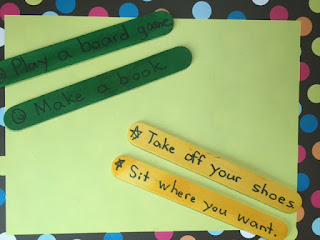Why? Jumbo craft sticks fit my criteria of cheap, simple, and easy. They are inexpensive, virtually indestructible, and can be transformed into a game or management tool in five minutes. In a plastic/screen world, sticks provide a natural element and something children can hold in their hands.
I hope over the next few days one or two of these ideas will “stick” and work in your classroom. Today you’ll find management sticks, tomorrow literacy sticks, and the next day math, games, and art sticks.
Song Pops - Cut 3" circles out of construction paper. Write song titles on the circles and glue to craft sticks to make "song pops." Place in a can and when you need to wiggle and smile pull out a song pop and sing and dance!

Lucky Sticks - Have each child write their name on a stick. Place the sticks in a cup on the teacher’s desk. When there is a special job to be done the teacher chooses a stick. After that child has had a turn, her stick goes in the teacher’s desk. When all sticks have been selected, they all go back in the cup for another turn.

Question Sticks - Children write their name in the middle of a stick. Color one end green and one end red. Put the sticks in a can or cup with the green end up. The teacher asks a question, swirls the can around, and then chooses a stick. That child may answer the question or “phone a friend” for help. Place the stick in the can with the red end up after they’ve had a turn. When all the sticks are red on top, turn them over and start again.
Buddy Sticks - Put like stickers, letters, etc. on the bottom of sticks. When you get ready to do a partner project let children choose a stick. The person whose stick matches theirs becomes their partner.
*Put a letter, shape, numeral, and sticker on the four ends of the stick. Children will be surprised by the category you call for them to match up.

Happie Sticks - Write special things children can do if they finish their work early on sticks. Children can choose one at a time and do the activity.
For example: make a book, play a computer game, read a story, do a job for your teacher, play a board game, make something in the art center, etc.

Reward Sticks - Instead of tangible rewards, let children choose a stick with a non-tangible reward on it. For example: sit at the teacher’s desk, take off your shoes, no homework, 15 minutes of free time, chew sugar-free gum, sit by a special friend, choose a game for the class to play, etc.
Fiddlestick – Tie a 20” piece of string to the middle of the craft stick. Children keep this in their desk and when their hands get “wiggly” they can wind and unwind the string on the fiddlestick.

Blending Sticks – Color the left end of the stick green, the middle yellow, and the left end red. As you stretch out sounds in CVC words the children touch the green for the first sound, the yellow for the middle sound, and the red for the end sound. Have them slide their finger over the stick as they blend the sounds and say the word.

